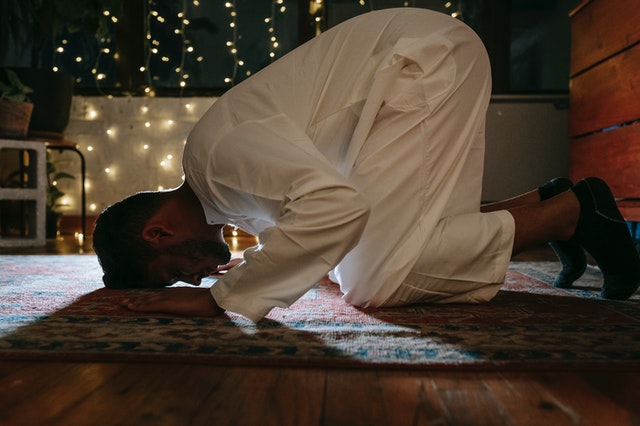Salah is a blessed gift that was especially given to the followers of Prophet Muhammad (PBUH) by Allah. Salah was never meant to be a burden, but a means to get closer to the Almighty and attain His boundless mercy and blessings. The fardh prayers, or the five daily prayers, are obligatory upon every able Muslim, while the nafl prayers, or the supererogatory prayers, are optional enabling one to gather additional rewards from our Lord. Among these nafl prayers is Tahajjud, the night prayer, that is said to be the most important salah after the obligatory prayers.
Abu Huraira reported that he, the Messenger of Allah (PBUH), was asked as to which prayer was most excellent after the prescribed (fardh) prayer, and which fast was most excellent after the month of Ramadan. The Prophet (PBUH) replied: “Prayer offered in the middle of the night (Tahajjud), and the most excellent fast after (fasting) in the month of Ramadan is the fast in God’s month, al-Muharram.” [Sahih Muslim]
What is the Tahajjud Prayer?
A number of hadith refer to Tahajjud prayers as the ‘night prayer’ that is offered between Isha and Fajr prayers. It should be noted that this salah cannot just be offered after Esha, rather Tahajjud is offered after a person wakes up from their slumber. As an authentic hadith narrates that Allah descends to the lowest heaven during the last third of the night to listen to the earnest call of His devotees, it is said that the best time to offer the Tahajjud prayer is before Fajr.
How many rak’at for Tahajjud prayer?
Narrated Nafi`:
Ibn `Umar said, “While the Prophet (PBUH) was on the pulpit, a man asked him how to offer the night prayers. He replied, ‘Pray two rak`at at a time and then two and then two and so on, and if you are afraid of the dawn (the approach of the time of the Fajr prayer) pray one rak`a and that will be the witr for all the rak`at which you have offered.” Ibn `Umar said, “The last rak`at of the night prayer should be odd, for the Prophet (PBUH) ordered it to be so. [Sahih Al-Bukhari]
There is no defined number of rak’at for Tahajjud prayers. You may offer two, four, six or eight raka’ts, followed by Witr (it should end with Witr). You may also opt to recite long or short surahs for the Tahajjud salah, depending on the availability of time. However, it is narrated that the Messenger of Allah (PBUH) used to pray 13 rakat (including Witr).
The importance of offering the Tahajjud Prayer
Indeed, sleep can be a challenge to give up. But just take a moment to reflect how your efforts of battling your own self and sacrificing your sleep to please Allah would be received by Him. The importance of Tahajjud salah has been highlighted in the Quran and Sunnah time and time again.
Narrated Al-Mughira: The Prophet (PBUH) used to stand (in the prayer) or pray till both his feet or legs swelled. He was asked why (he offered such an unbearable prayer) and he said, “should I not be a thankful slave.” [Sahih Al-Bukhari]
To stand earnestly in prayer while the others are asleep has to be one of the most blissful states one can be in. It is most certainly a noble deed that carries the promise of many blessings and rewards.
Allah has stated in the Holy Quran:
وَمِنَ ٱلَّيْلِ فَتَهَجَّدْ بِهِۦ نَافِلَةً لَّكَ عَسَىٰٓ أَن يَبْعَثَكَ رَبُّكَ مَقَامًا مَّحْمُودًا
“And from [part of] the night, pray with it [i.e., recitation of the Quran] as additional [worship] for you; it is expected that your Lord will resurrect you to a praised station.” [Surah Al-Isra 17:79]
The benefits of praying Tahajjud
There are numerous benefits to the Tahajjud prayer. These include:
Having your sins forgiven and your duas answered
Narrated Abu Huraira:
Allah’s Messenger (PBUH) said, “Our Lord, the Blessed, the Superior, comes every night down on the nearest Heaven to us when the last third of the night remains, saying: “Is there anyone to invoke Me, so that I may respond to invocation? Is there anyone to ask Me, so that I may grant him his request? Is there anyone seeking My forgiveness, so that I may forgive him?”[Bukhari]
Being recognized as a faithful servant of Allah
Allah says in the Holy Quran:
وَعِبَادُ ٱلرَّحْمَـٰنِ ٱلَّذِينَ يَمْشُونَ عَلَى ٱلْأَرْضِ هَوْنًا وَإِذَا خَاطَبَهُمُ ٱلْجَـٰهِلُونَ قَالُوا۟ سَلَـٰمًا
وَٱلَّذِينَ يَبِيتُونَ لِرَبِّهِمْ سُجَّدًا وَقِيَـٰمًا
“The faithful servants of the Merciful One are those who walk on the earth gently and when the foolish ones address them, they simply say: “Peace to you”; who spend the night prostrating themselves before their Lord and standing.” [Al-Furqan 25:63-64]
Getting closer to Allah
Prophet Muhammad (PBUH) is reported to have said: “Be vigilant in standing up [in prayer] at night, for it was the practice of the pious before you. It is a means of gaining proximity to Allah, expiation for transgressions and a barrier from sins.” [At-Tirmidhi]
The promise of paradise
‘Abdullah bin Salam (RAA) narrated that the Messenger of Allah (ﷺ) said:“O people, extend greetings (saying Salam to each other), keep relations with your kin, provide food (to people) and pray at night when people are asleep and you will enter Paradise in peace.” Related by At-Tirmidhi who graded it as Sahih.
To Conclude
The Quran and Sunnah have illustrated the rewards of the blessed Tahajjud prayer. So let us pay heed to these words and may we remain steadfast in our will to offer Tahajjud without fail, just as our beloved Prophet (PBUH). May we get closer to Allah and remain close to Him and may we be among those who enter paradise.



